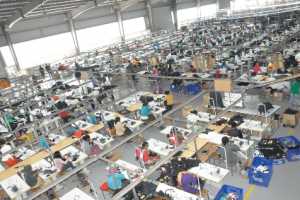- Stay Connected
Foreign investment continues in Ethiopia clothing sector

Addis Ababa, April 15, 2017 (FBC) – Ethiopia attracted foreign investments of 1.2 billion US dollars in the first six months of the 2016/17 fiscal year, with these financial injections dominated by major Chinese companies-half of which are licensed in textile and garment manufacturing.
Investors include the Jiangsu Sunshine Group, which engages in wool textiles and garments as well as a range of other sectors. The company has decided to invest close to 1billion US dollars in Ethiopia, according to the Ethiopian Investment Commission, starting by preparing the human resources ground and opening a training academy to improve the skill-set of Ethiopia’s textile and clothing sector workforce.
According to Mekonnen Hailu, public relations director for the commission, “The bulk of recent investment is being made by Chinese companies in the textile and apparel sector. The high level of investment is helping Ethiopia develop itself as a manufacturing hub for the global textile market.
Out of the 124 foreign investors that had expressed an interest in Ethiopia’s textile and clothing sector over the past three months, 71 were from China, according to the EIC. However, the Indian clothing and textile industry could also be a significant future player, with more than 30 investors being from this other major outsourcing country.
Chinese conglomerate Jiangsu decided to build a major textile manufacturing hub in Ethiopia for the same reasons that many other Chinese textile investors are choosing to relocate their textile operations to the east African country, says Helen Hai, vice-president of Chinese footwear manufacturer the Huajian Group and advisor to the Ethiopian government on industrial strategy.
“Chinese textile companies are moving closer to their raw material base, the cotton producing countries such as Ethiopia. This is part of its value chain repositioning, a strategy most Chinese companies are adopting. Companies are also using Africa as a gateway to emerging markets on the continent and to the European market,” adds Hai, who helped broker the Jiangsu investment deal.
Economic growth
Ethiopia’s economy has registered double digit growth in recent years, making it one of the fastest growing in sub-Saharan Africa. The World Bank projects 8.9% growth this year. Foreign investment has played a critical role in the country’s economic success, with the government taking a proactive approach by offering favourable benefit packages to attract clothing and textile companies looking to relocate their manufacturing bases to Africa.
Incentives include preferential trade deals and land policies, which can give investors profit tax holidays for up to nine years. Duty free importations of machinery, equipment and construction materials are also incentives used to attract investors.
All exports of products made in Ethiopia to the US are duty and quota free under America’s African Growth and Opportunity Act (AGOA). The same benefits are also available for exports to the European Union (EU) under its ‘Everything but Arms’ trade access for least developed countries.
Furthermore, Ethiopia offers extremely cheap electricity at 0.04 cents US dollars per kilowatt hour. It is now the second largest electricity producer in sub-Saharan Africa due to its hydropower dams -Ethiopia is the source of major rivers, such as the Blue Nile.
Such low costs are particularly attractive to Chinese companies, as the rising cost of land and labour in their home country has spurred many of its textile and clothing businesses to eye moving production to African countries such as Ethiopia to tap their abundant cheap labour -wages are approximately one tenth of what Chinese workers are paid, according to the investment commission.
“Ethiopia has a population of 100m, the second largest in Africa after Nigeria and over 65% are under 20, making it a labour pool that is easily trainable to fit the requirements of the garment and textile industry”, says Zemedeneh Negatu, global chairman of Fairfax Africa Fund and former managing partner of EY Ethiopia (Ernst & Young).
“Foreign textile increase”
Local textile companies can also find reasons to be hopeful about the “foreign textile increase” says Worku Zewde, general manager of Ethiopian knitted sportswear specialist Knit to Finish.
“Investors are putting money into training the local workforce to help raise manufacturing standards. To satisfy foreign buyers, the quality of cotton production has also been improving. I expect these industry improvements will trickle down and benefit local companies.
In order to keep up with and encourage demand, Ethiopia’s government is currently working to increase the quality and the volume of cotton produced within the country. At present, 3m hectares are available for cotton farming in Ethiopia; however, only 30-40,000 hectares are currently utilised.
According to the Ethiopian Investment Commission, no foreign investor has stopped operations since the government announced a state of emergency last October. While some restrictions were lifted in March, a further four-month extension has since been put in place until 8 August.
Indeed, the benefits of investing in Ethiopia’s textile sector still outweigh any risk argues Hai, who believes the Ethiopian government’s strategy to prioritise the textile industry so it can drive economic development and job creation is a major source of confidence for Chinese textile investors.
“Unlike other African countries where corruption in the financial and political sphere has made investors very nervous, Ethiopia stands out to textile investors as they see that their business goals are in alignment with the development goals and agenda of the country,” she says.
Source: just-style.com
